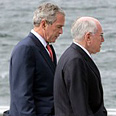
Foreign Minister Alexander Downer's statement closely followed a strong defense on Friday by U.S. Secretary of State Condoleeza Rice of expanded U.S. sanctions on Tehran.
"If their enrichment program isn't suspended some time fairly soon, as it's meant to be, then you will see a lot of countries introducing different types of measures and sanctions against Iran," Downer told ABC Television's Lateline program late on Friday.
The United States slapped new sanctions on Iran on Thursday, accusing its Revolutionary Guard of spreading weapons of mass destruction.
This sent New York oil prices surging on Friday to record highs above $92 a barrel on supply fears. Russian President Vladimir Putin added to tensions by criticizing the U.S. sanctions, ahead of Downer's statement.
Downer told the ABC that Washington was not trying to set itself on a path to war with Tehran, although the Americans as a matter of doctrine never ruled in or ruled out military action.
"What they're doing is applying much tougher sanctions against Iran," he said.
The European Union, Japan and Australia would wait "for a little while" to see if further progress eventuated in negotiations with Iran on the nuclear issue, Downer said.
The Australian Foreign Minister said he expected the global community to be looking at financial sanctions against Iran.
"There is quite a preference for those sorts of measures," he said.
On Thursday Washington imposed sanctions on more than 20 Iranian companies, banks and individuals as well as the Defense Ministry, hoping to increase pressure on Tehran to stop uranium enrichment and to curb "terrorist" activities.
Australia's conservative government led by Prime Minister John Howard was an original backer of the U.S.-led invasion of Iran's neighbor Iraq in 2003, to counter weapons of mass destruction then believed to be held in Iraq.
Australia sent 2,000 troops to Iraq in a decision that sparked the biggest anti-war protests in Australia since the Vietnam conflict. Australia still has more than 1,500 troops in and around Iraq.
The decision to invade Iraq is a highly contentious issue in the Howard government's tough battle to win re-election in a national poll on November 24.
The centre-left opposition Labor Party, which is far ahead of Howard's coalition in opinion polls, would also support "in the strongest terms" economic and political sanctions against Iran if it won office in November, Tony Burke, Labor's spokesman on immigration, said on the Lateline program.
But the Labor Party has promised to withdraw frontline troops from Iraq if elected, although it still supports Australia's deployment of about 1,000 troops in Afghanistan.















